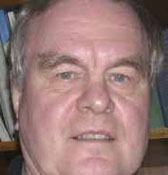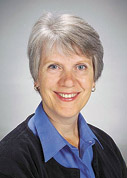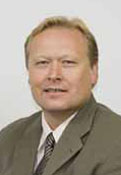Canadian Mennonite
Volume 12, No. 19
Sept. 29, 2008
Readers Write
We welcome your comments and publish most letters sent by subscribers intended for publication. Respecting our theology of the priesthood of all believers and of the importance of the faith community discernment process, this section is a largely open forum for the sharing of views. Letters are the opinion of the writer only—publication does not mean endorsement by the magazine or the church. Letters should be brief and address issues rather than individuals.
Please send letters to be considered for publication to letters@canadianmennonite.org or by postal mail or fax, marked “Attn: Readers Write” (our address is on page 3). Letters should include the author’s contact information and mailing address. Letters are edited for length, style and adherence to editorial guidelines.
What’s in a name? A lot if it’s Funk!
Re: “A grand slam in the Mennonite Game” letter, July 7, page 7.
As a person from a Pennsylvania Swiss Mennonite background living in western Canada and surrounded by Mennonites of Russian background, it’s very difficult for me to play “the Mennonite Game.”
So I got to thinking about Mennonite names. Are there any of the same names found in both Russian and Swiss communities? The only one I could come up with was Funk.
John F. Funk is regarded as the outstanding leader of the (old) Mennonite Church in the 19th century, according to the Mennonite Encyclopedia. In 1864, Funk started publishing The Herald of Truth and Herold Der Wehrheit from his Mennonite Publishing Company.
While in Chicago, Funk met D. L. Moody, who influenced his progressive ideas about Sunday school, evangelism and religious publication. Funk later moved his printing business to Elkhart, Ind., where he attracted many younger, progressive-minded men and helped to make Elkhart a centre for mission activities, education and publishing. Funk played a major role in assisting Russian Mennonites to immigrate to the Midwest U.S. and Canada.
A lesser-well-known Christian Funk of several generations earlier was a bishop in the Franconia Mennonite Conference of Eastern Pennsylvania. He was an able leader with very decided views. During the time of the American Revolutionary War, Christian Funk opposed other Mennonite bishops over the legitimacy of the new Colonial Congress government. Three other groups joined him to form what was known as “the Funkites” and later became attached to a splinter group called the Reformed Mennonites.
Another Funk who contributed much to the church was Joseph Funk of the Shenandoah Valley of Virginia. His community became known as Singers Glen! In 1832, he published The Harmonia Sacra hymnal that contained “Praise God From Whom” (No. 606)!
The Funks of the Russian Mennonite variety may have contributed much to our peoplehood, I don’t know. The only one I personally know is another John Funk, who lives here in our valley and has been active in Christian Peacemaker Teams, having courageously spent time as a witness in Palestine.
Are the two Funk lineages related? I have heard that they both possibly sprang from a South German background. Someone else can maybe fill in the blanks.
Letter writer should also submit to ‘the authority of Scripture’
Re: “Don’t place the environment above human beings” letter, Aug. 18, page 9.
Kevin Schroeder should be commended for his emphasis on the importance of “submitting to the authority of Scripture” and that “[w]e should not claim Scripture says something it does not.” However, he makes numerous assumptions and assertions, but chooses not to base them on “a single line of Scripture.”
The assertion that God created the planet for the individual human opens the door to owning and then using it as one pleases. It reminds me of a scene from a Dostoevsky novel on a Moscow street, in which a man is mercilessly beating his emaciated horse. Pedestrians intervene. His reply: “I own it, it is mine. So I can do with it what I want.”
When Wesley preached Christ in the English countryside, and people experienced “being born again,” even his established church detractors said that when people were converted, their wives, families, cattle and their land were treated better. This was, as in St. Paul’s words, how “to own Jesus as Lord of all.”
Biblically speaking, the human is not a pinnacled potentate. All of creation—not only the human—lives and has its being under the joyful provenance of God’s creation. Contrary to Schroeder’s view, we are but grateful, humble stewards of a wondrous creation.
Without a spiritual and moral perspective, there’s little distance between use and abuse. Schroeder should express his thankfulness for oil to the impoverished Nigerian farmers and fishermen whose land and water have been destroyed by oil leaks and heedless discharge!
Ethical scientific methods needed to save the environment
Lately, Mennonite magazines—and even scholarly journals—have featured articles on the environment and looking after creation as an important part of our human relationship with God and the earth. Exhortations to improve our attitudes and actions, and lyrical praises of nature’s wonders, are common. Accurate information on the actual state of the environment is less common.
As a first step in addressing environmental problems, an attitude shift is essential, but the need is too urgent to wait for cultural change before initiating actions. Putting our good intentions into practice demands reliable information, and here is where science is useful.
One example that applies to Mennonite (and other) farmers, industrialists, colonists and field workers providing advice to disadvantaged people is the concept of “tipping points,” introduced to Canadian Mennonite readers by Paul Fieguth in the March 3 issue. Environmental scientists and managers call these tipping points “thresholds.”
Disturbance thresholds are important in all systems, including ecological ones. Ecosystems function via interconnections, meaning that an impact on one part of a system affects all other parts. The more diverse the system, the higher its disturbance threshold, so if one part of a system is knocked out, other parts take over, often unpredictably. Single crop ecosystems and genetically uniform plants and animals, for example, lack the diversity needed to be resistant to persistent disturbance.
Environmentally concerned people tell us we should treat the environment with care, avoiding excesses. Ecological science backs them up, and we know enough to be careful. Near my home, for example, the threshold in Canada’s northern forest at which large herbivores begin to irreversibly decrease in numbers occurs when about half of a given area is cleared of trees. Ecologists have shown that when 90 percent of a natural area is destroyed, there will be at least a 50 percent loss of animal diversity. Science may help us to exploit ecosystems with ever-increasing efficiency, but it also provides decision-making tools to ensure sustainability.
Some environmentalists argue that science is the cause of our environmental problems, and that the answer is to seek a change in our basic environmental ethic. Some Christians argue that all scientific methodology used to identify and solve environmental problems should be tested against biblical principles, to ensure that what is done is ethically sound. Good. Then let’s do the same for industry, agriculture and pesticides.
Science has indeed wrought environmental and military evils in the world, but there also can be no doubt that ethical science is needed to help relieve us of the mess we have created in creation.
From Our Leaders
Behind the troops

I have a friend who has a bumper sticker on his car that says, “If you’re not behind our troops, try getting in front of them.”
This slogan is a rather clever piece of advertising. If it’s meant to be taken literally, then of course I’m behind the troops because I’m certainly not in Afghanistan in front of them. If it’s meant to be taken figuratively, then I feel certain I’m in front of them; in fact, I’m way ahead of them, since I have a theology and a philosophy that goes well beyond physical force in resolving conflicts.
Advertising is an integral part of our society. If we can’t avoid them, we try to ignore them. When ads pop up on the Internet, we get used to this and try to block them. On television, we change channels. On e-mail, we filter them out. On the other hand, when we are looking for a new pair of shoes or a new computer, we scan the ads to see what is available or where the best deals might be found.
Take military ads. . . . They don’t seem to mention shooting others or bombing villages.
But it’s hard to detect the subtleties that marketers employ. Take military ads. I have seen more and more of these lately, and they focus primarily on several things that have little to do with the purpose of the military; they promise careers, an education or travel. They don’t seem to mention shooting others or bombing villages. “Let the buyer beware” applies here. It may be obvious that the main task of the military is to control others by physical force, so if people are going to join the armed forces they should know that is what they are going to do.
If that is the case, then why do we have so many deserters? When we had a prayer vigil at this year’s assembly for American deserters Corey Glass and Robin Long, I asked myself why these people would have enlisted in the first place.
We know that the military recruits in places where likely applicants are vulnerable—in places of high unemployment, and among the young, who are likely to be more inexperienced. These people may be more desperate, or more easily taken in by the lure of the promises in the ads. It wasn’t until he was in Iraq that Glass learned of the atrocities being committed, at which point he refused to participate in them any longer.
When the Iraq war first began, I was amazed how many people in Mennonite churches supported it. We learned later what was really going on there and how deceptive all the talk of weapons of mass destruction was, and how sophisticated the media of the war machine really was. Glass and Long weren’t the only ones taken in by subtle advertising.
Family Ties
Let’s party!

From my mother I learned the value of celebrating parties. With her eight children, she faithfully observed the same birthday ritual. As the day drew near, she asked each child, “What kind of meal would you like on your birthday? And what kind of cake?”
Then she lovingly fulfilled the order, whether it was for hamburger or fries or Swiss steak, for cakes with baseball themes or cakes like princesses. This was no small feat, especially during her four sons’ birthdays, which all occurred within 10 days in June and July. My mother’s gift let her children know that each one mattered and that each one was special and unique.
She probably is responsible for sowing the seeds that led to a great party I had this summer. For people born in 1954, like me, this year represents a special milestone. Our age—54—matches the year in which we began life. That seemed reason enough to me to plan a special party. A second motivation involved welcoming my husband home from Uganda, where he’d spent much of the year on a short-term peace research assignment with Mennonite Central Committee. In truth, I don’t need much of a reason to party, but these two reasons, a special birthday and a special homecoming, called for a special party.
Any social group is strengthened and made healthier by celebrating frequently and well.
And was it ever wonderful! Marilyn Houser Hamm, our friend and superb church musician, agreed to lead a hymn sing. Musicians from our church, Springstein Mennonite, supported the singing with guitars, violin, mandolin and piano. A couple of other friends added percussion. And dozens of friends rounded out the event by filling the church pews and singing their hearts out. It was rousing and satisfying. Marilyn led us in the most awesome birthday song, the second half of No. 118 in Hymnal: A Worship Book (formerly No. 606), using the words, “Happy birthday, happy birthday, happy birthday to you.”
Afterwards, we visited over cake and coffee, with warm smiles and delighted laughter. It was one of the best days of my life.
Celebrations make life better. They’re occasions to take stock, give thanks, mark what is special, but especially to join with others in affirmation, affection and laughter. Any social group is strengthened and made healthier by celebrating frequently and well. That’s true whether it’s a family, church or even just a group of two, like a married couple or a pair of siblings. When we take note of life’s accomplishments, whether they’re little ones like baby’s first steps, or big ones like completing a high school degree or 50 years of marriage, we allow ourselves to savour what brings us pleasure—growth, succeeding at a goal, overcoming adversity. When we celebrate with others, our happiness expands. We enjoy their achievements; their presence at our celebrations adds meaning and depth.
In the Christian church, we celebrate the Lord’s Supper. What does it mean that we celebrate this most holy of serv-ices? Although our services of communion are often sombre, on some occasions we joyfully share the bread and cup. This may be especially true when communion occurs with baptisms, or at weddings, as is the practice of some churches.
Perhaps our celebration of communion or birthdays are ways of glimpsing one part of God, the God who lives as Three-in-One, a lively intermingling of delight and mutual playfulness, a God who made us to be in happy relation with each other. Another good reason to party!
God, Money and Me
Gratitude is humbling

Don’t you love those “eureka” moments? The moments when something happens that makes you jump for joy or do one of those hockey fist-pump things. Let me tell you my latest one.
I am the father of two teenage daughters. This means they are smart and I am not. (I am told I will grow out of it). As parents, my wife and I have tried to raise them as best we can and in a way that God would approve of. This includes nurturing a spirit of generosity. When our children were young, we gave them an allowance and helped them divide it into three piles, one for sharing, one for saving and the other for spending.
Now our oldest is in her senior year of high school and working part-time. The allowance is gone and the road to self-sufficiency has begun. The decisions she makes with her paycheques are hers to make. My wife and I have very little say in the matter anymore.
A few Sundays ago, my oldest sat beside me in church. Normally she sits with her friends, but they were at the youth retreat and she was scheduled to work that weekend. When the offering plate was passed that morning, she opened her wallet and made a gift.
My job was done and I had been successful in teaching generosity. Mission accomplished.
That was it. My “eureka” moment! She had learned generosity. All those years of allowances and dividing it into three little piles had paid off. My job was done and I had been successful in teaching generosity. Mission accomplished. In retrospect, I was more than a little smug in what I thought I had accomplished.
Not long afterwards, while reading It All Goes Back in the Box, a great little devotional guidebook to life by John Ortberg, I stumbled upon a line that ended my prideful feelings very quickly. “Gratitude is always an act of humility,” he wrote. Hmmm.
I was very grateful that my daughter had made an offering on her own accord. Perhaps she had done so humbly, but I was anything but humbled by it. I had taken the credit for her generosity. As I thought about what I was reading, I remembered something else I once read by Christian educator Richard Foster: “Faith is not taught, it is caught.” In other words, we can’t make someone have faith, we can only model it in the hope that they will come to embrace it as their own.
In an ironic twist, I may have felt my daughter had learned the joy of generosity, but it turns out I had something to learn. It wasn’t my teaching on allowances and sharing that brought my daughter to this point, although I like to think it helped. Ultimately, God had been at work in her life and my job was to express my own gratitude—humbly, I might add—for what God had done, rather than feel pride in my parenting ability.
I can’t wait until I am as smart as my kids!